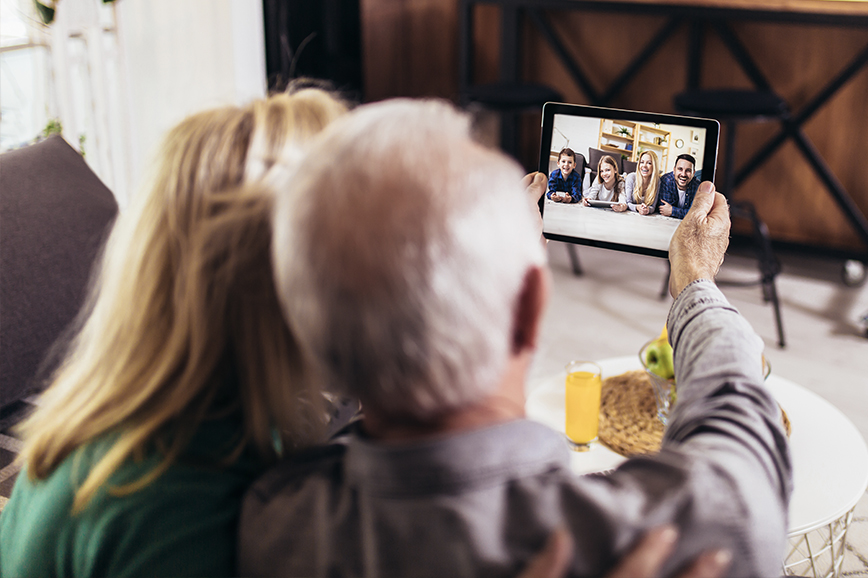What is emotional wellness? The term refers to an awareness, understanding and acceptance of your emotions, and the ability to deal with challenges and change. Remaining in the present moment is also vital to your emotional health.
Emotional wellness for seniors is key to a happier, healthier life. In fact, it can help older adults quickly bounce back from difficulties. They’re also able to hold on to positive emotions and appreciate the good times longer.
While it is always important to take care of your emotional health and entire well-being, decreasing your stress during these unprecedented times can help give your immune system a boost and allow you to get through the day a bit smoother.
To learn how to maintain emotional wellness, here are nine strategies that will help you stay resilient, manage stress when larger personal issues arise, and improve your overall mental health. These activities are also good options for dealing with social isolation and loneliness during COVID-19.
9 Emotional Wellness Activities
1. Be positive. While occasionally being in a bad mood is normal, constantly having a negative attitude undermines your internal happiness. To develop a more positive mindset:
- Give yourself credit for the good things you do each day.
- Everyone makes mistakes. Forgive yourself and others, and learn from what went wrong, but don’t dwell on it.
- Surround yourself with positive, healthy people.
- Explore your beliefs about the meaning and purpose of life, and use them to guide your decisions.
- Focus on the good. Few things are all good or all bad. You’ll feel better if you look at the positive aspects of people, new experiences, meals and everyday activities.
2. Get connected. Scientists are finding that our social connections can have a powerful effect on our emotional and physical health. To strengthen your social circle, reach out to friends and loved ones by phone and through social media. Your grandchildren and younger family members can also show you how to connect virtually through FaceTime or Zoom and how to share pictures and videos. Other options include:
- Join a virtual group focused on one of your favorite hobbies.
- Take an online class to learn something new.
- Volunteer for things you care about in your community.
- Go for a walk and follow social distancing rules when visiting neighbors.
3. Relieve stress. Stress is normal, and its energy rush can help us get things done. Chronic stress is being on “high alert” for a long time and does more harm than good. Here are some healthy ways to cope with stress and boost your resilience:
- Get enough sleep.
- Just 30 minutes a day of walking can boost your mood and reduce stress.
- Build a social support network.
- Set priorities by deciding what must get done and what can wait. Say no to new tasks if they are putting you into overload.
- Note what you’ve accomplished at the end of the day, not what you’ve failed to do.
- Mindfulness, meditation, yoga or tai chi may help you relax.
- Deep breathing and progressive muscle relaxation can also help reduce stress.
- Spending time in nature can create more positive feelings and better mental health, along with lower levels of depression and stress.
- Talk with a mental health professional if you feel unable to cope, have suicidal thoughts, or use drugs or alcohol to cope.
4. Quality sleep. Vital to our well-being, sleep affects both our mental and physical health. To get better-quality sleep:
- Go to bed the same time each night, and get up the same time each morning.
- Sleep in a dark, quiet, comfortable environment.
- Exercise daily (but not right before bedtime).
- Limit the use of electronics before bed.
- Relax before bedtime with a warm bath or by reading.
- Avoid alcohol and stimulants such as caffeine late in the day.
- Avoid nicotine.
- Consult a health care professional if you have ongoing sleep problems.
5. Establish boundaries. The feeling of having too much to do can cause frustration, anxiety and stress. Some important ways to establish boundaries include:
- Having clear priorities will help you figure out what you’re actually willing to spend your time and energy on.
- Let people know what you will and will not tolerate. People will never know that what they’re doing is unacceptable if you never tell them.
- Don’t feel like you need to say yes to avoid hurting someone’s feelings. You know the difference between being excited to do something and dreading it. Use that instinct to help you make decisions.
- Think about the amount of time something will take compared to the amount of positive impact it will have. If it will take up more time than it’s worth, say no.
- Make sure you spend time doing things that bring you joy and help you feel better about yourself.
- If someone asks you to do something and you don’t think you’re the right person for the job, suggest someone else.
- Don’t let people talk you into things you don’t want to do or out of things you want to do.
6. Be mindful. Mindfulness is about being completely aware of what’s happening in the present. It means not living your life on “autopilot.” To be more mindful:
- Breathe in through your nose to a count of 4, hold for 1 second, and then exhale through the mouth to a count of 5. Repeat often.
- Go for a walk, and notice your breath and the sights and sounds around you. If thoughts and worries enter your mind, note them but then return your focus to what you’re hearing and seeing around you.
- Mindful eating is being aware of taste, textures and flavors in each bite.
- Find mindfulness resources in your local community, including yoga and meditation classes, mindfulness-based stress-reduction programs, and books.
7. Cope with loss. The death of a loved one can feel overwhelming. But most people can make it through the grieving process with the support of family and friends. Healthy ways to cope with loss include:
- Take care of yourself. Try to eat right, exercise and get enough sleep. Avoid bad habits that can put your health at risk.
- Talk to caring friends.
- Find a grief support group.
- Wait a while before making big decisions like moving or changing jobs.
- Talk with your doctor if you’re having trouble with everyday activities.
- Sometimes short-term talk therapy can help.
- Mourning takes time. It’s common to have roller-coaster emotions for a while.
8. Accept yourself. We are usually our own harshest critic and set expectations for our life and behavior that we wouldn’t set for others. Everyone has self-judgment and self-doubt. Learning to accept yourself is a gateway to a happier, healthier life. Start accepting yourself by:
- Surrounding yourself with positive affirmations and things that inspire you. When you feel insecure and doubt creeps into your thoughts, turn to one of your inspirations.
- Let go of what you think perfection looks like. The pursuit of perfection can keep you from accomplishing your goals. Good can be good enough.
- Make a conscious effort to stop assuming you know what people mean. If you’re not clear on the meaning of a specific comment, all you have to do is ask.
- Forgive others for things they didn’t mean to do or didn’t know they did. Forgive yourself for mistakes you think you’ve made and if things don’t change quickly enough.
- Believe that you can do anything because you can. You’ve already survived the worst thing you’ve experienced in your life.
- Figure out what motivates you by celebrating something you are bad at. It’s in our failures, not our successes, that we learn the most about ourselves.
9. Ask for help. If you are suffering from emotional distress, it’s OK to ask others for help. Everyone has moments of stress, and you are not alone. People to talk to include:
- A friend or family member you trust and who’ll be a good listener is a good place to start.
- Get the perspective of others to hear how they would handle a situation.
- Seek the advice of a mental health professional.
Home to Emotional Wellness
Practicing emotional wellness is easier when you’re part of a senior living community of like-minded people who want to get the most out of life. At McLean, part of our health and wellness philosophy includes teaching emotional wellness for seniors and practicing how to maintain emotional wellness. If you’d like to learn more, contact us here.
Here are some strategies we use with our community, to help you stay resilient, manage stress and improve your overall mental health during the COVID-19 pandemic.


